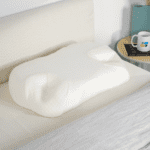Sleep deprivation is a common experience for parents of a new baby. While it may not be possible to completely avoid night wakings, there are steps caregivers can take to increase the amount of sleep they get. We discuss some strategies for getting better sleep and take a closer look at the effects of sleep deprivation.
What Causes Sleep Deprivation for New Parents?
Babies have very different sleep patterns from adults and wake up to eat multiple times throughout the night. As a result, caregivers may get too little rest, poor quality sleep, or both.
Most adults sleep in a single block of six to eight hours at night. Newborns, on the other hand, sleep for short periods during the day and night—about 16 to 18 hours of each 24 hour period. This lasts until babies are about 3 months old, when they begin to sleep more at night.
Other factors may also contribute to new parents’ sleep deprivation.
- Fussing: Babies cry frequently, especially in the first three months of life —so even when someone else is tending to the baby, a caregiver might experience sleep disruptions.
- Feedings: New babies frequently wake in the night for feedings. Studies suggest that parents who breastfeed may get slightly less sleep than those who bottle feed their babies.
- Physical discomfort: Most new parents may experience physical pain as a result of giving birth or of breastfeeding.
- Stress, anxiety, and depression: The transition to parenthood can be stressful. In the months after bringing home a baby, caregivers may also be vulnerable to anxiety and depression. Stress, anxiety, and depression can all contribute to sleep problems, and sleep deprivation can also aggravate these conditions.
Tips for Parents to Get Better Sleep
Bringing home a new baby can be an overwhelming experience. If you’re struggling with sleep deprivation, newborn care can feel particularly challenging. Although prioritizing sleep may seem difficult during this time of transition, there are a few steps you can take to get a bit more rest while you care for your little one.
- Sleep when the baby sleeps: If possible, try to sleep when the baby sleeps—even during the day—to minimize your sleep debt. While daytime naps may not be feasible for caregivers with work responsibilities or other children in their care, consider going to bed early if the baby goes down before your usual bedtime.
- Avoid bright light and screens during night wakings: Bright lights and blue light from electronic devices can suppress the sleep hormone melatonin and make you and your baby feel more alert. During nighttime feedings, use dim light and avoid your cell phone to ensure that you and the baby can get back to sleep as quickly as possible.
- Trade off with another caregiver: If you have a partner, enlist their help, or team up with a willing friend or relative. If possible, develop a schedule that lets both of you sleep in shifts. If necessary, use earplugs or sleep separately to ensure one of you can sleep while the other cares for the baby.
- Get help from relatives and friends: Find out if any of your friends or relatives are able to watch the baby so that you can nap. They may also be willing to help with housework or caring for other children so you can sleep.
- Take steps to reduce stress: Having a new baby comes with plenty of stress, which can keep you awake. If you’re feeling overwhelmed, talk to someone about it, and write your feelings down. Consider trying a relaxation technique, such as meditation, to help you release stress and worry.
When to Talk to Your Doctor
It is normal to lose some sleep when you’re caring for a baby. However, speak with your doctor if you think a lack of sleep is affecting your physical health, your ability to function during the daytime, or your mental health.
References
Ask the Sleep Doctor
Have questions about sleep? Submit them here! We use your questions to help us decide topics for articles, videos, and newsletters. We try to answer as many questions as possible. You can also send us an email. Please note, we cannot provide specific medical advice, and always recommend you contact your doctor for any medical matters.




































